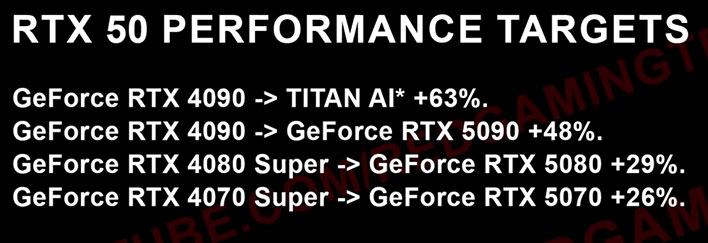GeForce RTX 50 And Titan GPUs Allegedly Target A Massive Performance Uplift Up To 63%
The most recent claims come from YouTuber RedGamingTech, who says that Blackwell RTX 50 series GPUs may have a performance uplift of over 60% over the existing GeForce RTX 40 series. While this is obviously a significant number, it also has a ring of plausible reality considering recent developments in NVIDIA's push towards overall dominance.
The GeForce RTX 4090 wowed enthusiasts and reviewers upon its release, dwarfing the previous flagship RTX 3090 handily. With a potential RTX 5090 packing GDDR7 VRAM, and a possible 500 watt power target, the specs certainly do point to a powerful product.
GDD7 memory is going to be more efficient than existing GDDR6X, allowing for more performance and better thermals. This will allow NVIDIA to push the envelope, where VRAM has increasingly become vital to both gaming and productivity workloads.
The Blackwell architecture for RTX gaming products may see 28GB of GDDR7 VRAM, running at a 448-bit memory bus. A potential rumored RTX Titan variant may even run up to 512-bit memory bus, surpassing the performance of the supposed RTX 5090.

Source: RedTechGaming
Other models in the Blackwell RTX 50 series lineup will also supposedly see significant gains over the prior generation. This includes an RTX 5070 and RTX 5080, although the uplift is rumored to be more tempered and measured compared to the more colossal RTX 5090, as can be seen in the screenshot above. According to the YouTuber, the GeForce RTX 5080 will be 29% faster than the GeForce RTX 4080 Super, and the GeForce RTX 5070 will be 26% faster than the GeForce RTX 4070 Super (if meeting the rumored performance targets).
NVIDIA also has to take care to keep its GPUs reasonable enough to not be affected by import bans (at least the Chinese market), which has targeted powerful products such as the RTX 4090 in the past. Time will tell if the uplift is in rasterized or upscaled performance, in conjunction with technologies such as ray tracing. It will likely be a combination of all factors, as NVIDIA appears to be making ready some impressive generational gains.
While the launch of the RTX 50 series is still up in the air, rumors have circulated around either late 2024, or early 2025. If it was indeed 2025, CES in January would be the most likely proving ground for this new GPU announcement. Pricing is unknown, and will also be a large factor in determining how popular these GPUs will be with consumers.

